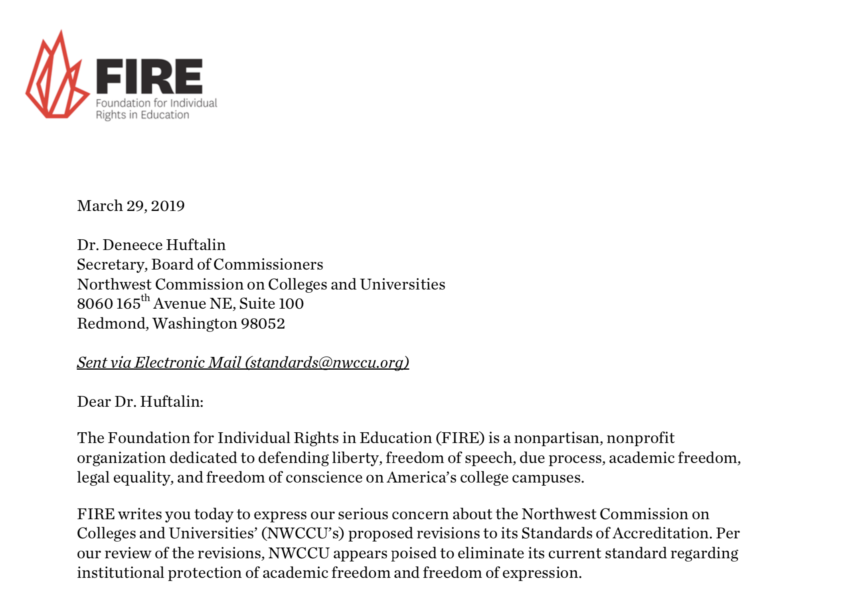That would be the Board of Regents of the University of Alaska system. There is no evidence that NWCCU President Sonny Ramaswamy is considering similar action against Chuck Lillis, Angela Wilhems, and the UO Board of Trustees:
Posts tagged as “accreditation”
Hannah Kanik has an excellent explanation of what happened here. Chuck Triplett has a long history of hiding things from the faculty at UO, and at his previous job at OUS, and it seems unlikely that he’ll face any disciplinary action for this latest.
Another 4/1/2019 update:
The influential Foundation for Individual Rights in Education also wrote to the NWCCU against their plan to remove academic freedom from their accreditation standards:
Full letter here.
4/1/2019 update:
Thanks to the AAUP-Oregon’s Michael Dreiling for alerting the UO Senate and Provost to the NWWCU’s proposed accreditation standards. His letter asking AAUP members to press the NWCCU on this is here:
We write to you with an urgent request to take action and protect academic freedom as a standard and criterion for accreditation by the Northwest Commission on Colleges and Universities (NWCCU), the largest single accreditation body in the region. Inexplicably, the latest draft of accreditation standards from the NWCCU removes all references to academic freedom and to institutional bodies and practices of shared governance such as university senates, faculty vote and voice, and tenure (see the proposal and compare to current standards here). The strong emphasis on centralized authority and the implicit erasure of faculty participation in decision-taking is new and it is a threat to the integrity of higher education at hundreds of colleges and universities in the region. …
As you can see below, many issues with these proposed revisions remain unresolved, but NWCCU Pres Sonny Ramaswamy has promised to keep freedom, and give more time for input on other issues:
From: Sonny Ramaswamy <sonny@nwccu.org>
Sent: Sunday, March 31, 2019 10:07 PM
Subject: Revision of NWCCU’s Standards
ALOs.
Over the last couple of weeks we have received emails regarding NWCCU’s draft, revised Standards from AAUP affiliates and faculty senate chairs, and provosts of a few institutions. (Those individuals are copied on this email.)
Additionally, we have received input during conversations with some individuals.
Based on the recent input received, we’ve made a decision to incorporate appropriate language in our draft Standards for Academic Freedom and Governance, along with revisions on other matters suggested by others.
We’ve extended the deadline for submission of additional comments for revisions through April 15, 2019.
The draft will be revised and sent out for further comments in May. The draft will be revised based on this round of comments.
After the Commission has provided additional comments on the near final draft, it’ll be revised as needed. Then it’ll be sent out for a vote by NWCCU’s family of institutions to approve the proposed Standards in late Summer 2019.
As I have noted previously, this is an iterative process and we appreciate the input, which continues strengthen the Standards.
Our hope is that, once approved, the new Standards will be deployed starting in January 2020.
If not already done, please connect with your relevant faculty organizations on your campuses, such as faculty senate chairs, and exhort them and other faculty to provide input regarding the draft Standards.
They may submit their comments on the current version of revised Standards available at (http://www.nwccu.org/accreditation/standards-review/) either via this link (https://www.tfaforms.com/4719938) or via email (standards@nwccu.org).
Thanks for your help.
Sonny Ramaswamy, President
Northwest Commission on Colleges and Universities
8060 165th Avenue NE, Ste 100 | Redmond, WA 98052
Email: sonny@nwccu.org
Tel: 425-558-4224
URL: http://www.nwccu.org
Twitter: @NWCCUSonny
The letter to the NWCCU from the UO Senate President (me) is here. The letter from UO Provost Jayanth Banavar is here. My response to the email above is:
Dear Pres Ramaswamy –
I’m glad to hear this. Thank you for responding to the concerns regarding academic freedom.
For those from other institutions considering commenting on the NWCCU’s proposed changes to our accreditation requirements, I’ve attached the letters to the NWCCU from the UO Senate and the UO Provost.
As you can see these address issues beyond academic freedom, and include such matters as shared governance, research, governing board evaluations, institutional control over transfer credits, student success metrics and their use.
I look forward to seeing how the next draft addresses these concerns.
For those interested, I’ll continue to update the posts at https://uomatters.com/tag/accreditation with new information.
Yours,
Bill Harbaugh
University of Oregon
Senate Pres & Econ Prof
3/26/2019: UO’s accreditor considers weakening academic freedom and governance standards
Sorry, long post.
UNC History Professor Molly Worthen in the NYT on learning outcomes assessment: I teach at a big state university, and I often receive emails from software companies offering to help me do a basic part of my job: figuring out what my students have learned. If you thought this task…
11/26/2013 repost.3/25/2013: UO’s academic accreditation comes through the NWCCU, which in turn is supervised by the US DOE. UO filed it’s latest report on 3/1/2013, compiled by Dave Hubin. Full of bold talk and more than a few half-truths. Read it all here. The cover page refers to our goal…
8/6/2013: It now takes months and hundreds of dollars to get public records from UO. OUS is quicker, but often no cheaper. Both adjust their pace to the politics. And apparently Gottfredson’s performance has now become a political issue for OUS. I sent OUS a follow-up request for information about…
7/19/2013: UO is under-administrated? Our academic accreditors, the Northwest Commission on Colleges and Universities, require that 2.A.11 The institution employs a sufficient number of qualified administrators who provide effective leadership and management for the institution’s major support and operational functions and work collaboratively across institutional functions and units to foster fulfillment of the…
